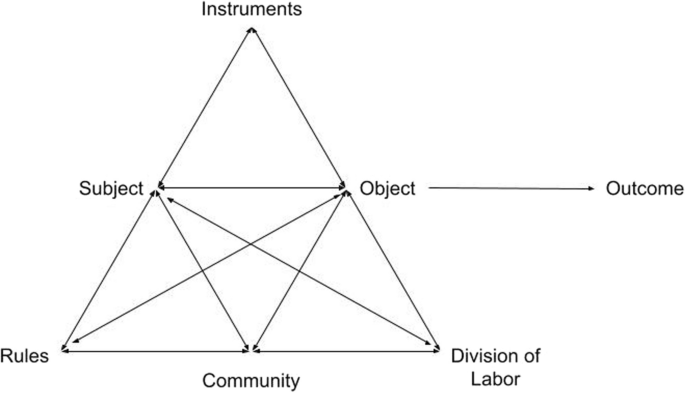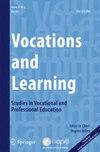“Fractional” Vocational Working and Learning in Project Teams: “Project Assemblage” as a Unit of Analysis?
IF 1.8
2区 教育学
Q2 EDUCATION & EDUCATIONAL RESEARCH
引用次数: 1
Abstract
Abstract Situated and Activity theories have exercised a significant influence in the field of vocational learning for some considerable time, both sharing a focus on bounded forms of work and forms of learning that facilitate learning in, or to changes to, bounded forms of work. Yet much learning occurs in unbounded contexts often referred to as projectification, where collaborations occur only for the life of a project thereby creating new contingent contexts for learning . Given the existence of this form of working and learning, what type of unit of analysis (UoA) is required to analyse that vocational working and learning in the context of projectification? To address this question, the paper advances the following inter-theoretical argument. Firstly, it is timely to develop a new unit of analysis (UoA) to capture the fractional (intermittent, discontinuous and concurrent) working and learning dynamics associated with the forms of projectification, where funding has to be procured in order to commence. Secondly, that unit of analysis is constituted by the concept of project assemblage, which is based on ideas from Actor Network Theory, Cultural-historical Activity Theory and Cultural Sociology. Thirdly, this new UoA enables researchers to identify the way in which project teams, where members are coming in-and-out, learn to use their different forms of specialist activity to enact objects, why team members will have different backgrounds and understandings of their work, why objects may not cohere, even though team members may treat them as unified and coherent, and how team members learn to incorporate one another’s insights and suggestions, and establish a finalized object.

项目团队中的“分式”职业工作与学习:作为分析单元的“项目组合”?
情境理论和活动理论在相当长的一段时间内对职业学习领域产生了重大影响,它们都关注有限的工作形式和促进有限工作形式中的学习或改变的学习形式。然而,许多学习发生在无界环境中,通常被称为项目化,其中合作只发生在项目的生命周期中,从而为学习创造了新的偶然环境。鉴于这种形式的工作和学习的存在,需要什么样的分析单元(UoA)来分析投影背景下的职业工作和学习?为了解决这个问题,本文提出了以下理论间的论点。首先,开发一个新的分析单元(UoA)来捕捉与项目形式相关的零碎的(间歇的、不连续的和并发的)工作和学习动态是及时的,在项目形式中,必须获得资金才能开始。其次,以行动者网络理论、文化历史活动理论和文化社会学的观点为基础,构建了项目组合的分析单元。第三,这种新的UoA使研究人员能够确定项目团队(成员进出的地方)如何学习使用不同形式的专业活动来制定目标,为什么团队成员会有不同的背景和对工作的理解,为什么对象可能不连贯,即使团队成员可能将它们视为统一和连贯的,以及团队成员如何学习整合彼此的见解和建议,并建立最终的目标。
本文章由计算机程序翻译,如有差异,请以英文原文为准。
求助全文
约1分钟内获得全文
求助全文
来源期刊

Vocations and Learning
EDUCATION & EDUCATIONAL RESEARCH-
CiteScore
5.30
自引率
17.90%
发文量
21
期刊介绍:
Vocations and Learning: Studies in Vocational and Professional Education is an international peer-reviewed journal that provides a forum for strongly conceptual and carefully prepared manuscripts that inform the broad field of vocational learning. The scope of the journal and its focus on vocational learning is inclusive of vocational and professional learning albeit through the very diverse range of settings (e.g. vocational colleges, schools, universities, workplaces, domestic environments, voluntary bodies etc) in which it occurs. It stands to be the only truly international journal that focuses on vocational learning, as encompassing the activities that comprise vocational education and professional education in their diverse forms internationally. Vocations and Learning aims to: enhance the contribution of research and scholarship to vocational and professional education policy; support the development of conceptualisation(s) of vocational and professional learning and education; improve the quality of practice within vocational and professional learning and education; and enhance and support the standing of these fields as a sectors with its own significant purposes, pedagogies and curriculums. Vocations and Learning: Studies in Vocational and Professional Education encourages the submission of high-quality contributions from a broad range of disciplines, as well as those that cross disciplinary boundaries, in addressing issues associated with vocational and professional education. It is intended that contributions will represent those from major disciplines (i.e. psychology, philosophy, sociology, anthropology, history, cultural studies, labour studies, industrial relations and economics) as cross overs within and hybrids with and amongst these disciplinary traditions. These contributions can comprise papers that provide either empirically-based accounts, discussions of theoretical perspectives or reviews of literature about vocational learning. In addition, books, reports and policies associated with vocational learning will also be reviewed. Topics addressed through contributions within the proposed journal might include, but will not be restricted to: curriculum and pedagogy practices for vocational learning the role and nature of knowledge in vocational learning the nature of vocations, professional practice and learning the relationship between context and learning in vocational settings the nature and role of vocational education the nature of goals for vocational learning different manifestations and comparative analyses of vocational education, their purposes and formation organisational pedagogics transformations in vocational learning and education over time and space analyses of instructional practice within vocational learning and education analyses of vocational learning and education policies international comparisons of vocational learning and education critical appraisal of contemporary policies, practices and initiatives studies of teaching and learning in vocational education approaches to vocational learning in non-work settings and in unpaid work learning throughout working lives relationships between vocational learning and economic imperatives and conceptions and national and trans-national agencies and their policies.
 求助内容:
求助内容: 应助结果提醒方式:
应助结果提醒方式:


